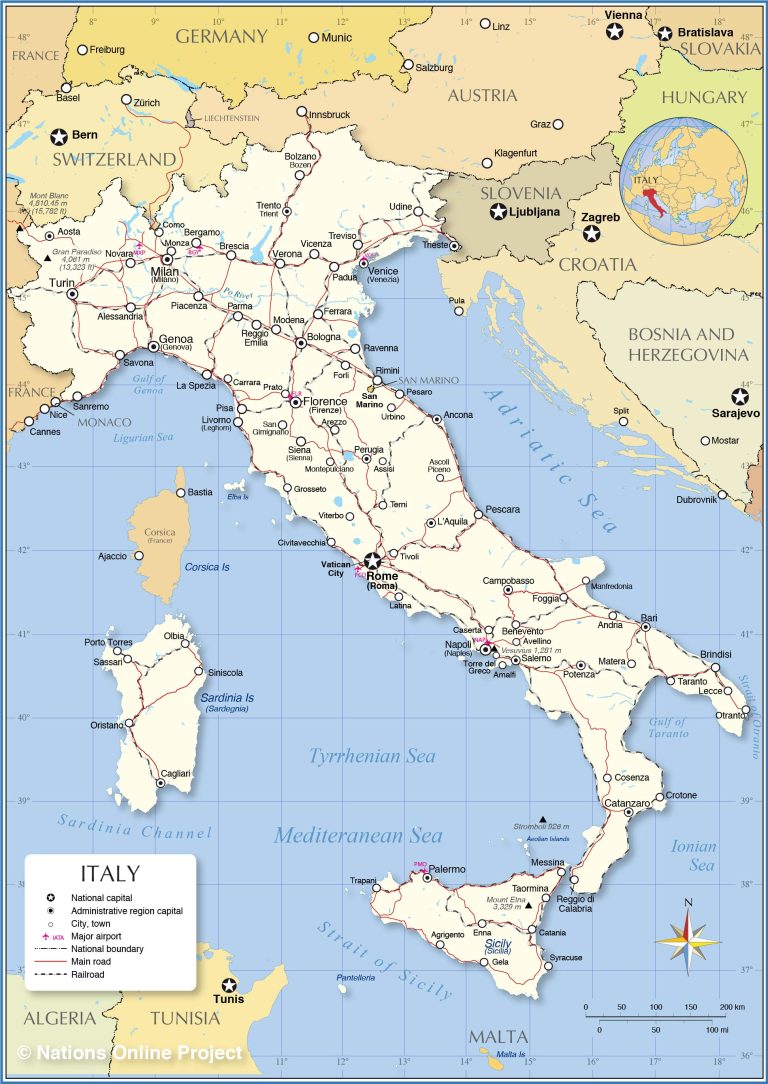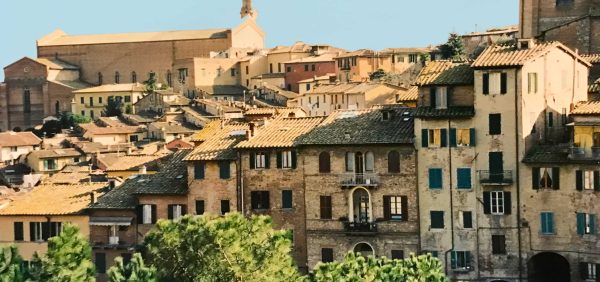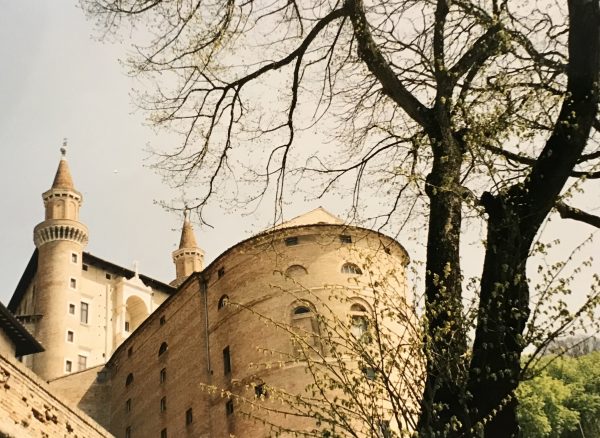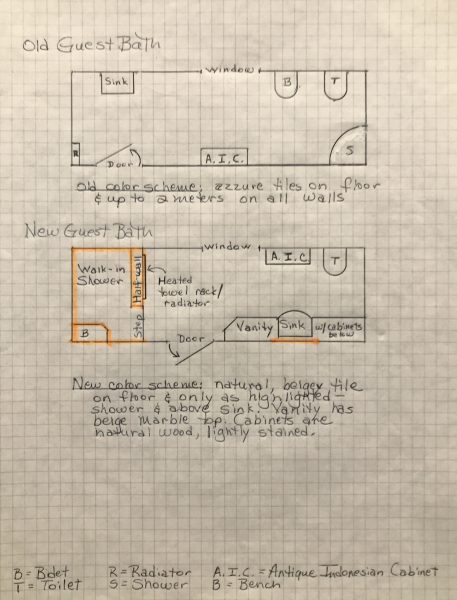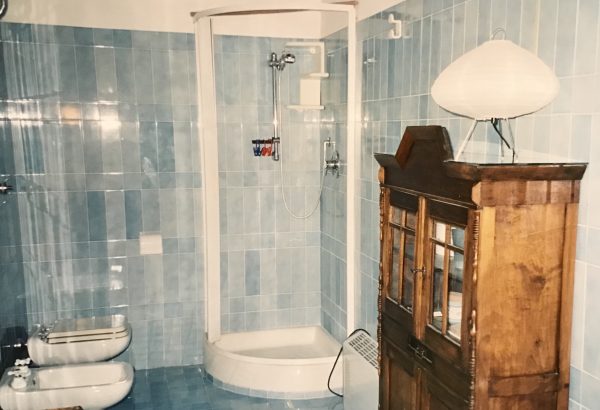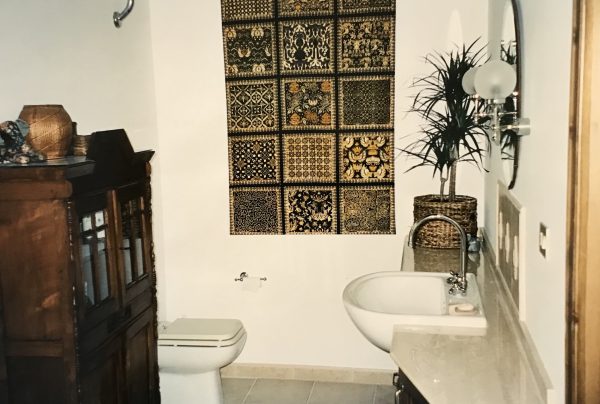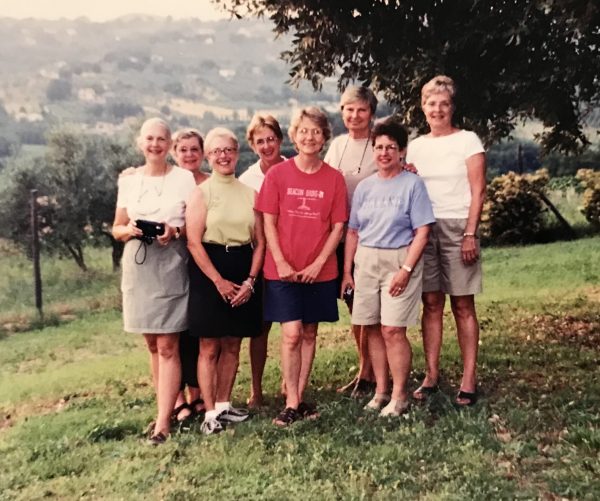#52: Italy, January – June, 2003
Separation, War, Renovation and Reunion
During our first year of running two households — Russell in Sri Lanka, me in Italy — we began to learn how to make separation work, staying in touch via emails and getting together every quarter. Meanwhile, my life went on — marketing my book, overseeing another renovation, organizing a sorority reunion and contemplating war in the Middle East.
Here are edited excerpts from monthly letters to family and to friends who were like family. As always, you can click on images to enlarge them.
January
After seven years in Italy, we finally made it to Siena, thanks to the United Nations Development Programme, the sponsor of Russell’s project in Sri Lanka. He was supposed to return to Colombo on the 16th, but what with various bureaucratic hassles, his departure kept being postponed, and our lives remained in limbo. Finally, we decided that since UNDP couldn’t get their act together, we’d just leave all the stress behind for a weekend and enjoy a place we’d always wanted to visit.
A pleasant, two-hour drive through a sunny winter’s morning brought us to the car park just inside Siena’s Porta Romana (the “Roman Gate” — virtually every town has one). Then we schlepped our one small bag through increasingly smaller streets until we arrived at a medieval tower house now converted to a hotel with eight small rooms, each with a very tiny bath. The perfect accommodation for us, full of history and conveniently located.
We immediately set off for the famous Piazza del Campo, where the annual horse race is run around the fan-shaped plaza. Most of the year, Siena is full to the brim with tourists, but during the winter months, it’s possible to sit in the Piazza, savor a coffee and watch the Sienese go by — some in fur coats and expensive Missoni scarves, some in fancy hats (both men and women), some in the typical attire of students all over the world.
Thus fortified, we walked over to the Palazzo Publico, the old city hall, now a museum. There I once again discovered how much I prefer medieval art to that of the Renaissance. There is something about its simplicity that appeals to me, rather like Japanese art in its two-dimensionality and use of color, iconic rather than realistic.
After a simple lunch, we hiked up to the Cathedral, which was built in imitation of the famous white-and-black striped one in Orvieto. Inside were remarkable works of art, from marvelously intricate marble floors in russet, black and cream to a bronze statue of John the Baptist by Donatello and wonderful frescoes of medieval life in an adjacent library.
We later joined the evening passagiato (pahss-ah-jah-to), strolling among enticing shops on both sides of the streets amid delicious scents of coffee, pastries and dinner a-cooking. But when we were ready to eat, we learned a hard lesson: Saturday is the night when most Sienese go out for dinner. We entered restaurant after restaurant only to be told they were “completo.” Finally, we managed to get the last table available in an osteria, the simplest type of restaurant but often with some of the best food. These small places usually have only a few tables. Mamma’s cooking in the kitchen, Papa’s running the cash register, and the grown kids are waiting tables. We each had a tasty pasta and a salad, just what we were looking for after so long on our feet.
The next morning, we sauntered to the other end of town. For decades, Siena and Florence struggled for supremacy in that region of Italy. At one point, Florence was on top, and the Medicis built a fort on the outskirts of Siena to secure their power. This huge structure, with giant, arrow-shaped bastions on each corner still stands, but the ramparts are now planted with trees, and the interior houses an outdoor theater, wine-tasting facilities and exhibition space — a nice example of how old structures can be saved for new uses.
We returned to the Campo by a different route, enjoying the narrow streets lined with medieval houses interspersed with a 20th century building here and there. Then we ascended to where Siena is said to have begun, when the nephew of Romulus reportedly built a castle for protection against his uncle, one of the founders of Rome.
That afternoon, we hied off to Santa Maria della Scala, among the oldest hospitals in Italy, founded in the 800s. Now it’s a museum of local art from Greek to modern times. We split up, each concentrating on his/her own interests. I immediately headed for the Labyrinth, two floors below street-level. Most ancient Italian towns have such a place, left over from pre-Roman times, when subterranean places had mystical associations. This one was dug from tufa (volcanic stone), and I wandered here and there, trying to get a feeling for what it must have been like when filled with devotees illuminated by torchlight.
Back above ground, I also visited the “Pilgrim’s Hall” with its frescoes of the hospital during medieval times — a religious institution run by friars. They attended not only to the sick and injured but also took in orphans, educating them and finding them spouses and livelihood when grown. The fascinating frescos included two men inspecting a flask of urine (how modern that seemed), a surgeon preparing to operate on a man with a badly cut thigh, a priest comforting a dying patient and the orphans’ wet nurses being paid in grain.
February
Russell eventually returned to Sri Lanka, and I’ve had lots of catching up to do. I spent the first couple of weeks of the month just taking care of boring busy-ness. So boring, I can’t even remember what I did.
Once things calmed down, I started preliminary work on marketing my book — prepping packets for potential agents according to what each one wants submitted. In the midst of this, I got an email from Susan Taylor Chehak, my teacher at the Iowa University writers workshop two summers ago. She’d just finished reading my manuscript, liked it a lot, recommending an agent and an approach for that agent. She also suggested marketing to many agents, because a given agent may have a full plate when the contact is made. So all this is keeping me off the streets.
Another writing effort came about by chance. I had such a horrific dream one night that the only way I could deal with it was to lie there and think about what might have happened before what I had dreamed and what could have happened afterwards. Then I got up and made some rough notes. The next day, I turned those notes into nine pages of single-spaced story-telling, trying to get the basic ideas down. Next, I sent that off to some folks for their reactions and got VERY positive feedback. I find myself so intrigued with the story that I’m tinkering with it a little every day. Think I’ll continue to work on this potential book while I’m marketing the first one.
[Some years later, that “nightmare” book became the second in my Lewiston, West Virginia mystery series, Lazarus. Still in print and still moving readers to comment.]
Graziano comes every week, helping with all the outdoor chores. Most recently, we worked for hours cutting back branches of broom broken by heavy, wet snow. Looks kind of bare now, but it’ll soon bounce back.
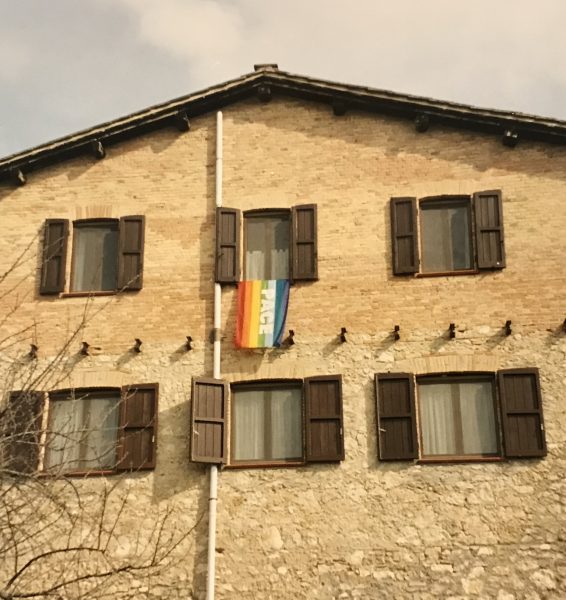 Of course, all my happenings seem inconsequential when viewed through the lens of a coming war in the Middle East. It’s a daily topic of conversation here as more and more rainbow-colored “Pace” (pah-chay — “peace”) flags appear hanging from windows and balconies. Most Europeans feel it’s too soon to go to war, that there’s no smoking gun, that diplomacy should be given a chance. And many Europeans believe that the U.S. is pushing for war not because of clear links between Iraq and terrorism but because the Bush administration wants to control Iraq’s oil. We’re now nearing the important deadline that Hans Blix (Chairman of the U.N. Monitoring, Verification and Inspection Commission) set for the destruction of Iraq’s missiles. We can only hold our breath and wait. One vision I have of the future is that Russell and I may not see each other for a very long time.
Of course, all my happenings seem inconsequential when viewed through the lens of a coming war in the Middle East. It’s a daily topic of conversation here as more and more rainbow-colored “Pace” (pah-chay — “peace”) flags appear hanging from windows and balconies. Most Europeans feel it’s too soon to go to war, that there’s no smoking gun, that diplomacy should be given a chance. And many Europeans believe that the U.S. is pushing for war not because of clear links between Iraq and terrorism but because the Bush administration wants to control Iraq’s oil. We’re now nearing the important deadline that Hans Blix (Chairman of the U.N. Monitoring, Verification and Inspection Commission) set for the destruction of Iraq’s missiles. We can only hold our breath and wait. One vision I have of the future is that Russell and I may not see each other for a very long time.
March
In these early days of war,
- when scores of civilians are dying daily, as well as combatants on both sides,
- when the decisions to fight appear to have been taken on the basis of hubris and wishful thinking,
- when a historically dangerous precedent for pre-emptive, unilateral intervention has been set with a consequent setback for international law,
- when domestic and world economies are reacting adversely,
- when the medium- to long-term destabilization of an already volatile region has been recklessly ignored and the threat of international terrorism increased,
it feels frivolous to send our regular family letter with the mundane details of our lives.
We hope there will be an early end to hostilities with limited casualties, followed by a return to multilateral cooperation for reconstruction. Building consensus is tedious and frustrating, marred by lots of hypocritical posturing and cynical horse-trading. But like democracy, with all its shortcomings, it’s the best choice for all who live on the only planet we’ve got.
Pray for peace.
April
April’s gone, and so has the snow on the mountaintops. When Zack and I walked through the field this morning, I saw hundreds of wildflowers — buttercups and borage, mustard and European poppies, fritillaries and vetch. Inside the fence, our garden is blossoming with iris and red-hot poker, sage and California poppies, pansies and petunias, plus daisies and geraniums of many hues. All this is very fortunate, because we had a late, three-day freeze that killed off many of the fruit blossoms, some of the iris and our very first blooms of wisteria. We’d waited three years for the latter, so it felt like a real blow. But patience was rewarded, and a few buds opened to give us a glimpse of what it might be like next year.
I wrote “us,” because Russell made it here for the week of his birthday, arriving at 10 pm on Saturday, flying via Zurich. A couple days’ rest, and we took off for the Adriatic coast, driving through the Sibylline Mountains, still streaked with snow. Our hotel was a converted Napoleonic fort right on the shore of a small bay. Only a few seafood restaurants and fishermen’s boats occupied the rest of the beach.
We took a day-trip up the coast to Pesaro and another inland to Urbino, whose duke is sometimes credited with starting the Renaissance. Although a mercenary hiring out his army to the highest bidder, he was also a patron of the arts who built a fairy-tale palace overlooking the valley below. Pesaro’s now a flourishing modern resort, but the ancient walled town further inland was delightful.
We returned to Amelia on Friday. Russell got on the plane the next day in order to arrive in Colombo on Sunday so he could get to work on Monday. This meant we didn’t have Easter together, my disappointment somewhat assuaged by an invitation to share their holiday dinner with one of families who’ve adopted us.
We’ve had so much good luck with renovations that it seems only fair that the current one has been plagued with hitches. Despite plans, we didn’t get started until the first of March, because the mason’s previous project ran into trouble and had to be extended to solve the problems. Once we were ready for the plumber to lay new pipe, he came down with the severe flu that’s been making the rounds and couldn’t come for two weeks. That put us behind even longer, because the other workers had understandably gone on to other projects rather than have down-time waiting for the plumber. Everyone finally got back on the job a couple weeks ago, and it’s almost done. Even though today’s a holiday, the mason’s in there putting finishing touches on the tiles.
As I think I mentioned, I’m hosting a reunion of sorority sisters, starting June 7, so I’m working hard to finish not only these renovations but also revisions to my first book, using the hand-written recommendations from agents who read my manuscript and responded
May
A month of extremes, as far as weather is concerned. It started off with the hottest temps on record, then continued with no rain, and now we’re having some rain almost daily (although not nearly enough to make up for the drought of winter and spring).
The guest bath is finally done, and I must say it’s a vast improvement. Better use of space with the door moved to a more central location and one whole end of the room now devoted to a walk-in shower instead of that dinky quarter-circle in the opposite corner. Sending a couple pix plus “before” and “after” floor plans, so you can get an idea of the changes.
Once the workmen left, vast amounts of time and energy have been, and are being, devoted to putting the house back together and cleaning up all the mess. Virtually every room was disturbed with items stored from the old bath, materials for the new bath or just getting stuff out of the way of falling dust.
I’ve finished this revision of my book, cutting some 60 pages, taking out most of the back story and editing down other stuff here and there. I’d like to lose another 30 pp if I can, so the final count will be around 350. Game plan is to put the draft away until after the summer’s visitors — Kappa sisters, stepsister Mary Anne and her girls, then Russell in the third quarter. I’ll return to it in August, taking another crack at revisions and sending it back to the agents who responded favorably with suggestions.
The Kappa Reunion was a grand success, according to the extravagant praise sent now that they’re back home. After visiting Florence and Rome with our friend June Hager as guide, the sisters spent the better part of a week here. Eight of them stayed in a B&B at the entrance to our lane with two in our guest room. All meals were at our house, including breakfast, everyone pitching in. Still, there was a lot of planning, organizing, shopping and prepping that fell to the hostess. So I didn’t get to spend as much time with the sisters as I had hoped.
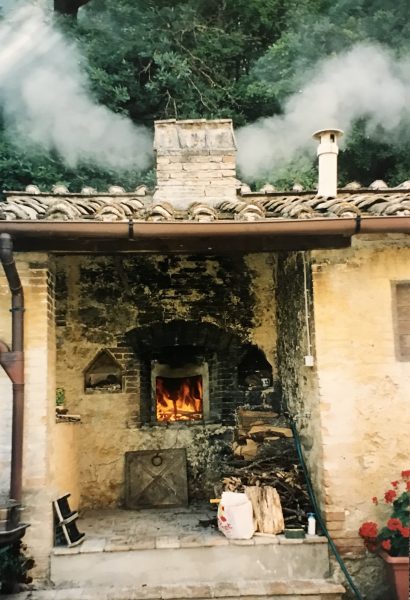 Around here, they especially liked the pizza made in our traditional wood-burning oven, the trip to the ancient ceramic center of Deruta (where two of them purchased full sets of dishes, while the rest bought everything from spaghetti dishes to souvenir plates), and the Sunday dinner cooked by the same woman who’d invited me to share her family’s Easter. Considered one of the best cooks in the region, Fosca served home-made fettuccini with a sauce of sausage and wild mushrooms, followed by chickens roasted over an open fire in my kitchen and oven-browned potatoes and a green salad. She harvested the wild mushrooms herself, and neighbor Ornella supplied the free-range birds. For dessert, we had profiterole from the bakery and Fosca’s crostata, a very “short” tart filled with a marmalade that she’d made from bitter cherries. After the sisters departed, best-friend-and-fellow-Kappa Bettina and I went to the beach for a few days of lazy R&R.
Around here, they especially liked the pizza made in our traditional wood-burning oven, the trip to the ancient ceramic center of Deruta (where two of them purchased full sets of dishes, while the rest bought everything from spaghetti dishes to souvenir plates), and the Sunday dinner cooked by the same woman who’d invited me to share her family’s Easter. Considered one of the best cooks in the region, Fosca served home-made fettuccini with a sauce of sausage and wild mushrooms, followed by chickens roasted over an open fire in my kitchen and oven-browned potatoes and a green salad. She harvested the wild mushrooms herself, and neighbor Ornella supplied the free-range birds. For dessert, we had profiterole from the bakery and Fosca’s crostata, a very “short” tart filled with a marmalade that she’d made from bitter cherries. After the sisters departed, best-friend-and-fellow-Kappa Bettina and I went to the beach for a few days of lazy R&R.
The last week has been full of various trials, not the least of which was the most violent storm since we moved here. For the second time this month, rain gushed out of the sky and flooded the living room via a pipe that carries wiring into the house. Because the storm was so severe, I locked the cats in the bedroom and brought Zack inside. Picture me in water an inch deep, a German Shepherd cowering under me, while I try to mop up like the Sorcerer’s Apprentice before the water can get to the furniture, all the while wondering if the lightening strikes all around would get close enough to fry me. Graziano and I thought we’d solved the problem awhile back, but something more serious than we realized is involved. I went to the electrician’s office today and asked that the head man come out ASAP, so we could make a major intervention. Stay tuned…

COMING NEXT MONTH
#53: July – December, 2003
Budapest, Venice and Sri Lanka,
plus back-home challenges with cistern, landslide and gas tank.

LET ME HEAR FROM YOU.
Please take a moment to share your thoughts.
Your comments help make the blog better, and I always answer.
* * *
If you enjoyed reading this post, I hope you’ll SUBSCRIBE by clicking on the button below. Every month, when I post a new excerpt from my life overseas, you’ll get an email with a link so you can read the next installment. Subscription is free, and I won’t share your contact information with anyone else. Your subscribing lets me know you’re reading what I write, and that means a lot.

